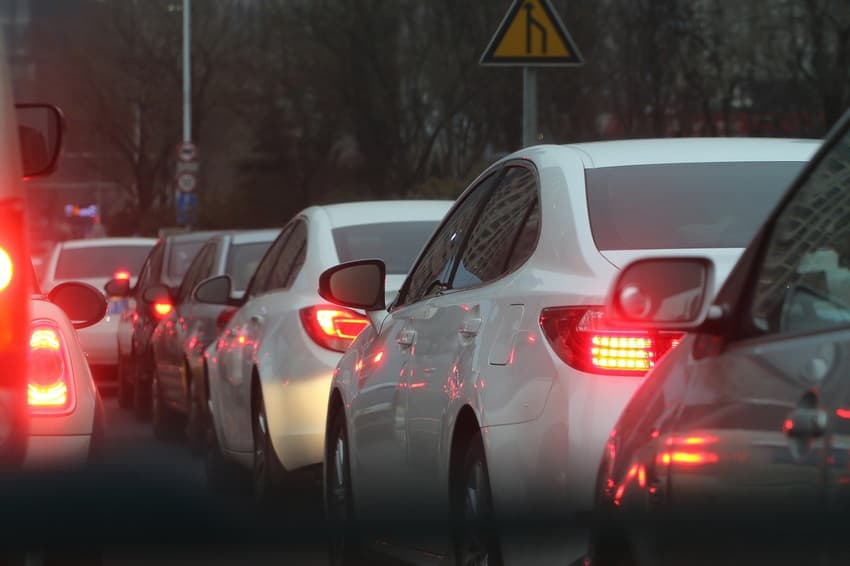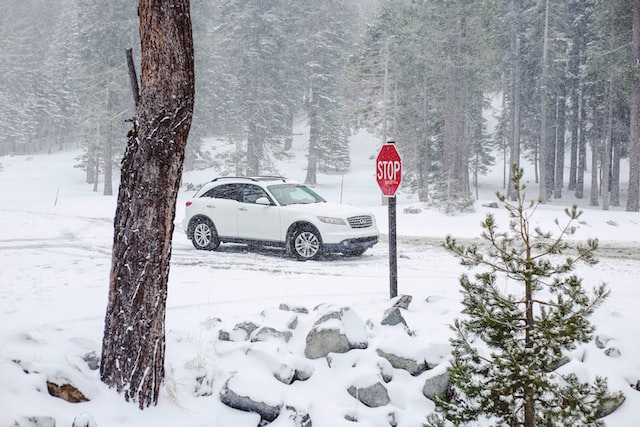‘Major disruption’: The roads to avoid during Switzerland’s ski holiday season

From now until the beginning of March, traffic on Swiss roads leading to and from the mountains will be heavier than usual. The government has issued information on where bottlenecks are most likely to occur.
"Due to holiday departures, long traffic jams and major road disruptions can be expected in February," according to The Federal Roads Office (FEDRO), which foresees “a considerable volume of traffic" on motorways, main, as well as secondary roads.
The A1, A2, A3, A6, A8, A9 and A13 are likely to be most impacted.
The A1 between the Härkingen interchange and the Bern region, the A1 and the A6 around Bern, the A6 and the A8 in the direction of the Bernese Oberland, the A9 in the direction of Valais from the La Veyre interchange, the Walendstadt – Reichenburg sections on the A3, as well as Sarganserland – Rothenbrunnen section on the A13, are expected to be most congested.
Bottlenecks are most likely on these roads:
Motorways
A1, Härkingen – Wangen a.A.
A1/A6, Bern region; A9 around Lausanne
A2, Basel
A2, Diegten – Härkingen
A2/A14, Lucerne area (from Stans-Nord)
A3, Walenstadt – Reichenburg
A6, Bern – Thun
A8, Brienz – Interlaken – Spiez
A8, Sarnen – Lopper
A9, Vevey – Martigny
A12 Châtel-St-Denis – La Veyre / Vevey
A13, Sarganserland – Rothenbrunnen
A28, Landquart – Klosters
Main roads
Spiez – Kandersteg
Gampel – Goppenstein
Roads in Bernese Oberland, Graubünden, and Valais
Avoid detours
FEDRO is asking motorists to stay on motorways and main roads despite traffic jams.
“When heavy traffic causes bottlenecks on the main axes, we often observe a transfer of traffic to the secondary network. This undesirable phenomenon weighs on the inhabitants of the localities bordering the national roads and ultimately has the effect of paralysing transport in the regions concerned,” it said.
As a result, traffic on these local roads — including public transportation — is disrupted and the risk of accidents increases.
“It is therefore important that travellers stay on the highway even in traffic jams, if only out of respect for the local population.”

Don't stray off the main roads. Photo by Giorgio Trovato on Unsplash
What you need to know before you hit the road:
From the beginning of this month, you must have the 2023 vignette attached to your car's windshield, or risk receiving a 200-franc fine if caught without it on a Swiss motorway. This obligation pertains to tourists as well, even if you remain here for only a short time, or just transiting through Switzerland on the way to another country.
The sticker can be purchased for 40 francs at at petrol stations, post offices, and border crossings.
READ MORE: Swiss vignette: What you need to know about Switzerland’s motorway charge sticker
What about winter tyres?
Driving in the snow is certainly easier — and much safer — if you have winter tyres on.
While there is no hard and fast rule in Switzerland for winter tyres, you have a responsibility to ensure that your vehicle is roadworthy - which means being ready for the conditions.
Certain roads can require you to have chains or winter tyres in order to drive on them in snow and / or ice.
Generally speaking, this will be on mountain roads or other passes, and will be designated by a sign.
This is not only a matter of safety (for you and other drivers), but also of your liability.
In the case of an accident, you may be found liable if the car is not properly equipped for the winter. The insurance company may not cover the full cost of the damage or may even take action against you for negligence.
Comments
See Also
"Due to holiday departures, long traffic jams and major road disruptions can be expected in February," according to The Federal Roads Office (FEDRO), which foresees “a considerable volume of traffic" on motorways, main, as well as secondary roads.
The A1, A2, A3, A6, A8, A9 and A13 are likely to be most impacted.
The A1 between the Härkingen interchange and the Bern region, the A1 and the A6 around Bern, the A6 and the A8 in the direction of the Bernese Oberland, the A9 in the direction of Valais from the La Veyre interchange, the Walendstadt – Reichenburg sections on the A3, as well as Sarganserland – Rothenbrunnen section on the A13, are expected to be most congested.
Bottlenecks are most likely on these roads:
Motorways
A1, Härkingen – Wangen a.A.
A1/A6, Bern region; A9 around Lausanne
A2, Basel
A2, Diegten – Härkingen
A2/A14, Lucerne area (from Stans-Nord)
A3, Walenstadt – Reichenburg
A6, Bern – Thun
A8, Brienz – Interlaken – Spiez
A8, Sarnen – Lopper
A9, Vevey – Martigny
A12 Châtel-St-Denis – La Veyre / Vevey
A13, Sarganserland – Rothenbrunnen
A28, Landquart – Klosters
Main roads
Spiez – Kandersteg
Gampel – Goppenstein
Roads in Bernese Oberland, Graubünden, and Valais
Avoid detours
FEDRO is asking motorists to stay on motorways and main roads despite traffic jams.
“When heavy traffic causes bottlenecks on the main axes, we often observe a transfer of traffic to the secondary network. This undesirable phenomenon weighs on the inhabitants of the localities bordering the national roads and ultimately has the effect of paralysing transport in the regions concerned,” it said.
As a result, traffic on these local roads — including public transportation — is disrupted and the risk of accidents increases.
“It is therefore important that travellers stay on the highway even in traffic jams, if only out of respect for the local population.”

Don't stray off the main roads. Photo by Giorgio Trovato on Unsplash
What you need to know before you hit the road:
From the beginning of this month, you must have the 2023 vignette attached to your car's windshield, or risk receiving a 200-franc fine if caught without it on a Swiss motorway. This obligation pertains to tourists as well, even if you remain here for only a short time, or just transiting through Switzerland on the way to another country.
The sticker can be purchased for 40 francs at at petrol stations, post offices, and border crossings.
READ MORE: Swiss vignette: What you need to know about Switzerland’s motorway charge sticker
What about winter tyres?
Driving in the snow is certainly easier — and much safer — if you have winter tyres on.
While there is no hard and fast rule in Switzerland for winter tyres, you have a responsibility to ensure that your vehicle is roadworthy - which means being ready for the conditions.
Certain roads can require you to have chains or winter tyres in order to drive on them in snow and / or ice.
Generally speaking, this will be on mountain roads or other passes, and will be designated by a sign.
This is not only a matter of safety (for you and other drivers), but also of your liability.
In the case of an accident, you may be found liable if the car is not properly equipped for the winter. The insurance company may not cover the full cost of the damage or may even take action against you for negligence.
Join the conversation in our comments section below. Share your own views and experience and if you have a question or suggestion for our journalists then email us at [email protected].
Please keep comments civil, constructive and on topic – and make sure to read our terms of use before getting involved.
Please log in here to leave a comment.